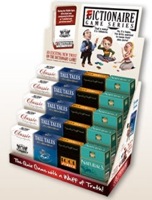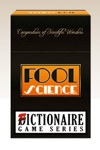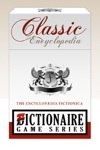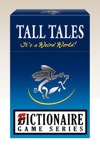by Lee Valentine
 Fictionaire
Fictionaire
Published by Days of Wonder
http://www.daysofwonder.com
Designed by Hervé Marly
60 double-sided question and answer cards (120 questions total), rules cards, 14 point cards to keep score
4-7 players
$10.00
Fictionaire is a new trivia game from Days of Wonder (DoW).
Fictionaire is unlike DoW's other big box releases like Ticket
to Ride or Small
World; this game is small enough to fit into your pocket.
Fictionaire has four distinct theme packs of question and answer
cards available: Classic Encyclopedia: The Encyclopaedia of
Fictionnica, Tall Tales: It's a Weird World!, Fool Science: Compendium
of Scientific Wonders, and Naturals: Chronicles of the Natural
World.
Gameplay
Fictionaire is like a crazy hybrid of concepts from Trivial
Pursuit, Balderdash, and Taboo. There is no board, just
cards, making the game playable almost anywhere. It could work at
lunch, at a party, or even on long road trips. Fictionaire has
almost the inverse theme of Balderdash. In Balderdash (or
"the dictionary game") one player knows a true definition of an obscure
word read from the dictionary and reads the word aloud. The other
players each make up and write down a fictional definition for the word,
which are then mixed with the real definition. Players vote on which one
is the correct one as they are read aloud.
 In contrast, Fictionaire allows all players to read a question.
One player ("the Host") allows all other players to read the correct
answer, but the Host is kept in the dark as to the truth. The other
players each then give an answer to the question aloud. One and only
one of those answers must be the truth and must use certain key words
written in red on the cards. The other answers given must be lies and
must not use any of the words in red. The Host guesses who is telling
the truth and the selected player gains a point. If the Host found the
true answer then he gets a point too, otherwise the selected player who
was lying gains a second point. The game is played for a set number of
questions and the player who is Host rotates.
In contrast, Fictionaire allows all players to read a question.
One player ("the Host") allows all other players to read the correct
answer, but the Host is kept in the dark as to the truth. The other
players each then give an answer to the question aloud. One and only
one of those answers must be the truth and must use certain key words
written in red on the cards. The other answers given must be lies and
must not use any of the words in red. The Host guesses who is telling
the truth and the selected player gains a point. If the Host found the
true answer then he gets a point too, otherwise the selected player who
was lying gains a second point. The game is played for a set number of
questions and the player who is Host rotates.
 Players who cannot come up with an answer can tell the truth, unless the
true answer has already been given that round, in which case they must
tell a lie or pass. If there's an irregularity in play (like everyone
telling a lie), the Host scores a point and he reads another question.
This can be a problem if playing with non-gamers, because a blunder here
or there caused by a lack of attentiveness or over-enthusiasm to lie can
deliver and unearned point to the current Host. The system can be
"gamed" slightly if you are so-inclined: if a given player is taking the
lead in scoring then all the other players can collude to never pick
him, guaranteeing that he can score at most one point per go around the
table, and only on his turn. I think the light-hearted nature of the
game will keep most players from exploiting these loopholes, but they
are worth mentioning. One unavoidable bit of gamesmanship, given the
short length of text on the cards, is that any answer longer than a few
sentences is obviously a lie. Non-gamers may not pick up on this latter
bit, but gamers definitely will.
Players who cannot come up with an answer can tell the truth, unless the
true answer has already been given that round, in which case they must
tell a lie or pass. If there's an irregularity in play (like everyone
telling a lie), the Host scores a point and he reads another question.
This can be a problem if playing with non-gamers, because a blunder here
or there caused by a lack of attentiveness or over-enthusiasm to lie can
deliver and unearned point to the current Host. The system can be
"gamed" slightly if you are so-inclined: if a given player is taking the
lead in scoring then all the other players can collude to never pick
him, guaranteeing that he can score at most one point per go around the
table, and only on his turn. I think the light-hearted nature of the
game will keep most players from exploiting these loopholes, but they
are worth mentioning. One unavoidable bit of gamesmanship, given the
short length of text on the cards, is that any answer longer than a few
sentences is obviously a lie. Non-gamers may not pick up on this latter
bit, but gamers definitely will.
The game is primarily designed to seat four to seven players but is
potentially expandable to seat more players if you own more than one
theme deck of cards. Each deck comes with enough point scoring cards
for a seven-player game.
I had trouble figuring out a score for Fictionaire's gameplay,
because it is heavily dependent on the group. If you have a
light-hearted group that likes trivia games, then Fictionaire
could rate an "A" for you. If your gaming group features more serious
strategy gamers or trivia purists who don't want to play multiple choice
with a bunch of liars, the game could fall flat. Like telling stories
around a campfire, Fictionaire is more of a vehicle for
entertainment rather than entertainment in and of itself.
Components & Packaging
 The packaging for the product is beautiful. Each pack is designed to
look like an old-fashioned, flip-top, cigarette box, including a silver
foil cover over the cards once you open up the pack. The questions are
on the top half of each card and the answers on the bottom half. The
package and card designs allow you to read the question without seeing
the answer if you so desire. The cards have one question and answer on
each side (front and back), which is a clever design, allowing you to
only see the question and answer for the current turn. While the card
box will keep the cards from falling out even while inverted, the top
cover does not lock in any formal way like a traditional tuck box.
The packaging for the product is beautiful. Each pack is designed to
look like an old-fashioned, flip-top, cigarette box, including a silver
foil cover over the cards once you open up the pack. The questions are
on the top half of each card and the answers on the bottom half. The
package and card designs allow you to read the question without seeing
the answer if you so desire. The cards have one question and answer on
each side (front and back), which is a clever design, allowing you to
only see the question and answer for the current turn. While the card
box will keep the cards from falling out even while inverted, the top
cover does not lock in any formal way like a traditional tuck box.
The cards are printed on a light cardstock. Each category of cards has
a different color scheme allowing you to play with multiple categories
during the same game while easily separating them out after the game.
There is no art in the game other than that on the card box itself.
The rules themselves are printed on cards. There were even rules about irregularities in play.
Conclusions
There's a lot to like about Fictionaire. It's inexpensive,
portable, and interesting (if you like trivia games, and I do). It has
a downside - there are only 120 questions per pack, so dollar-for-dollar
you are getting many fewer questions than you would if you bought the
latest edition of Trivial Pursuit. I did not have a problem with this,
because the play format can take three to five minutes per question
easily, meaning that a full game of 8-14 questions (depending on the
number of players) can take 20 minutes to an hour. You will get 8-15
plays out of each deck without repeating questions, which means just
about a dollar per game, making for a nice, inexpensive filler. While
the game doesn't break new ground with its mechanics, it's fun.
 The requirement to be fast on your feet with lying means that this game
may not have the same ease of play as a game like Trivial
Pursuit. Unlike Balderdash (where you submit your answers in
writing), here if you have a "tell" when you lie (like a smile), then
you are finished. Some of the non-gamers that I played with had trouble
with the notion that they had to use certain words (when telling the
truth) or had to avoid them (when lying), but most gamers won't have
this problem. As a result, I think this will have some appeal to
non-gamer geeks as an adult party game, and will have stronger appeal to
role-players, used car salesmen, and politicians, as these groups are
quick to come up with fictions.
The requirement to be fast on your feet with lying means that this game
may not have the same ease of play as a game like Trivial
Pursuit. Unlike Balderdash (where you submit your answers in
writing), here if you have a "tell" when you lie (like a smile), then
you are finished. Some of the non-gamers that I played with had trouble
with the notion that they had to use certain words (when telling the
truth) or had to avoid them (when lying), but most gamers won't have
this problem. As a result, I think this will have some appeal to
non-gamer geeks as an adult party game, and will have stronger appeal to
role-players, used car salesmen, and politicians, as these groups are
quick to come up with fictions.
I recommend Fictionaire as a fun filler or party game. Like the
retro packaging it comes in, Fictionaire is reminiscent of the
games of days gone by, particularly the adult party games of the 1980s.
If those appealed to you, or if a sandwich of trivia and lies sounds
like a good time, this is a good game to buy into for the price. If
not, you should avoid it, because there's not much else here.
For Retailers
I'm not going to provide a retailer salability score for this product
because it will probably sell quite well in the right venue, but I think
this may be a game that you have to actively support in a hobby game
store. If you do, then given its price point, it should sell well. If
you buy just a handful of individual decks and opt to go without a
counter display, this product may get lost on your shelves. It's
packaging is designed to look elegant, not to have bright,
fantasy-themed art or a big box like other hobby games.
There's apparently no POP display available for each individual type of
theme deck. Instead, there is a stair-stepped countertop display
measuring a bit over 9" wide that holds five each of the four different
deck themes (20 decks total). If you are willing to commit to a counter
display or a table island for some kind of walk-by display, then this
game's price point and attractive packaging may result in quite a number
of impulse buys over the upcoming holiday season. Days of Wonder is
also offering a free demo pack program for retailers.
This game's packaging and play style almost seems more at home in a
traditional book store or bookstore/cafe combo than in a hobby game
store selling CCGs and miniatures. DoW advertises that
Fictionaire is for players ages ten and up, but I suspect that
the cigarette-style packaging, the claim that it is a "Quiz Game with a
Whiff of Truth", and the mention of tobacco on the countertop display
itself might concern some non-smoking parents.
If you are lucky enough to get your hands on the limited edition version
of this game in the metal box, which collects all four theme decks into
one package, you should display it proudly. Again, the package on this
is designed for elegance rather than geek chic, but it certainly is
eye-catching.
Lee's Ratings
Overall: B (a good, portable vehicle for having fun)
Gameplay: B (will vary wildly from A to C depending largely on the play group)
Components: B+ (light card stock, but clever design that fits the core mechanic)
Appearance: B (no art, but impressive graphic design on the packaging)
Packaging: A- (light packaging that supports the rules well; the box doesn't lock entirely shut)
Rules: A
Links:
| Other Days of Wonder reviews on OgreCave: |
|
|


 Fictionaire
Fictionaire In contrast, Fictionaire allows all players to read a question.
One player ("the Host") allows all other players to read the correct
answer, but the Host is kept in the dark as to the truth. The other
players each then give an answer to the question aloud. One and only
one of those answers must be the truth and must use certain key words
written in red on the cards. The other answers given must be lies and
must not use any of the words in red. The Host guesses who is telling
the truth and the selected player gains a point. If the Host found the
true answer then he gets a point too, otherwise the selected player who
was lying gains a second point. The game is played for a set number of
questions and the player who is Host rotates.
In contrast, Fictionaire allows all players to read a question.
One player ("the Host") allows all other players to read the correct
answer, but the Host is kept in the dark as to the truth. The other
players each then give an answer to the question aloud. One and only
one of those answers must be the truth and must use certain key words
written in red on the cards. The other answers given must be lies and
must not use any of the words in red. The Host guesses who is telling
the truth and the selected player gains a point. If the Host found the
true answer then he gets a point too, otherwise the selected player who
was lying gains a second point. The game is played for a set number of
questions and the player who is Host rotates.
 Players who cannot come up with an answer can tell the truth, unless the
true answer has already been given that round, in which case they must
tell a lie or pass. If there's an irregularity in play (like everyone
telling a lie), the Host scores a point and he reads another question.
This can be a problem if playing with non-gamers, because a blunder here
or there caused by a lack of attentiveness or over-enthusiasm to lie can
deliver and unearned point to the current Host. The system can be
"gamed" slightly if you are so-inclined: if a given player is taking the
lead in scoring then all the other players can collude to never pick
him, guaranteeing that he can score at most one point per go around the
table, and only on his turn. I think the light-hearted nature of the
game will keep most players from exploiting these loopholes, but they
are worth mentioning. One unavoidable bit of gamesmanship, given the
short length of text on the cards, is that any answer longer than a few
sentences is obviously a lie. Non-gamers may not pick up on this latter
bit, but gamers definitely will.
Players who cannot come up with an answer can tell the truth, unless the
true answer has already been given that round, in which case they must
tell a lie or pass. If there's an irregularity in play (like everyone
telling a lie), the Host scores a point and he reads another question.
This can be a problem if playing with non-gamers, because a blunder here
or there caused by a lack of attentiveness or over-enthusiasm to lie can
deliver and unearned point to the current Host. The system can be
"gamed" slightly if you are so-inclined: if a given player is taking the
lead in scoring then all the other players can collude to never pick
him, guaranteeing that he can score at most one point per go around the
table, and only on his turn. I think the light-hearted nature of the
game will keep most players from exploiting these loopholes, but they
are worth mentioning. One unavoidable bit of gamesmanship, given the
short length of text on the cards, is that any answer longer than a few
sentences is obviously a lie. Non-gamers may not pick up on this latter
bit, but gamers definitely will.
 The packaging for the product is beautiful. Each pack is designed to
look like an old-fashioned, flip-top, cigarette box, including a silver
foil cover over the cards once you open up the pack. The questions are
on the top half of each card and the answers on the bottom half. The
package and card designs allow you to read the question without seeing
the answer if you so desire. The cards have one question and answer on
each side (front and back), which is a clever design, allowing you to
only see the question and answer for the current turn. While the card
box will keep the cards from falling out even while inverted, the top
cover does not lock in any formal way like a traditional tuck box.
The packaging for the product is beautiful. Each pack is designed to
look like an old-fashioned, flip-top, cigarette box, including a silver
foil cover over the cards once you open up the pack. The questions are
on the top half of each card and the answers on the bottom half. The
package and card designs allow you to read the question without seeing
the answer if you so desire. The cards have one question and answer on
each side (front and back), which is a clever design, allowing you to
only see the question and answer for the current turn. While the card
box will keep the cards from falling out even while inverted, the top
cover does not lock in any formal way like a traditional tuck box.
 The requirement to be fast on your feet with lying means that this game
may not have the same ease of play as a game like Trivial
Pursuit. Unlike Balderdash (where you submit your answers in
writing), here if you have a "tell" when you lie (like a smile), then
you are finished. Some of the non-gamers that I played with had trouble
with the notion that they had to use certain words (when telling the
truth) or had to avoid them (when lying), but most gamers won't have
this problem. As a result, I think this will have some appeal to
non-gamer geeks as an adult party game, and will have stronger appeal to
role-players, used car salesmen, and politicians, as these groups are
quick to come up with fictions.
The requirement to be fast on your feet with lying means that this game
may not have the same ease of play as a game like Trivial
Pursuit. Unlike Balderdash (where you submit your answers in
writing), here if you have a "tell" when you lie (like a smile), then
you are finished. Some of the non-gamers that I played with had trouble
with the notion that they had to use certain words (when telling the
truth) or had to avoid them (when lying), but most gamers won't have
this problem. As a result, I think this will have some appeal to
non-gamer geeks as an adult party game, and will have stronger appeal to
role-players, used car salesmen, and politicians, as these groups are
quick to come up with fictions.